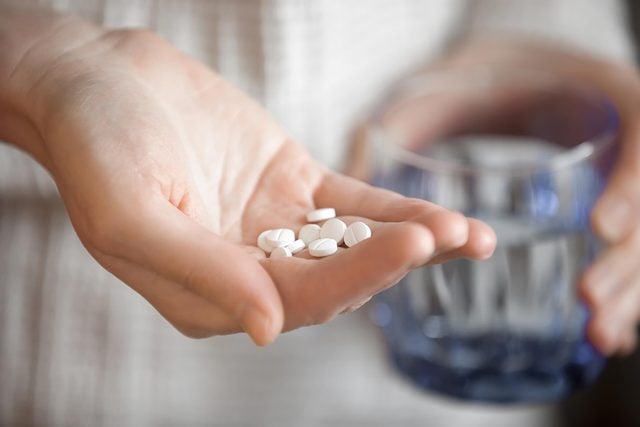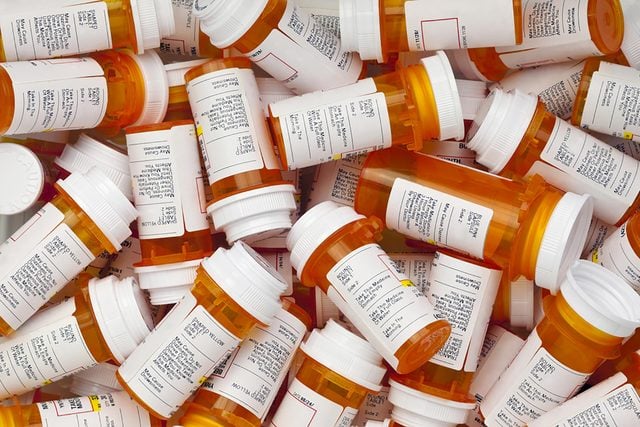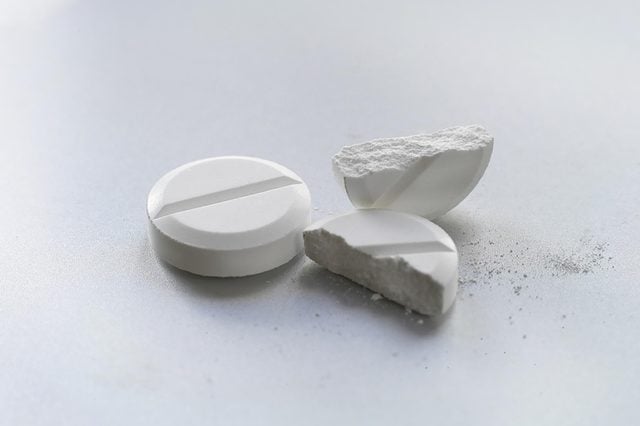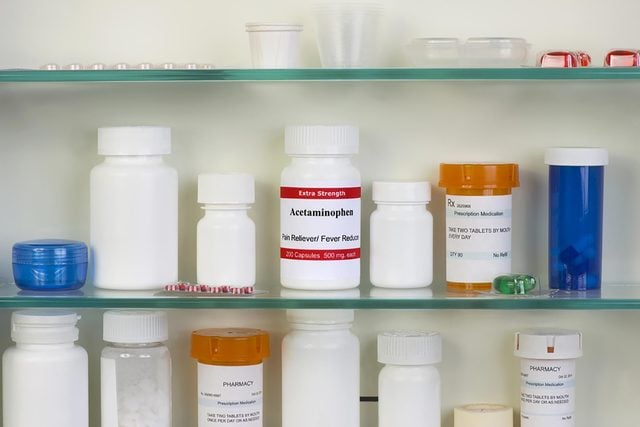
Denial
We can generally see trouble with others, but we can be oblivious to our own issues. This blindness can often crop up when it comes to addiction. An estimated 54 million Americans ages 12 and older have misused prescription drugs, according to the National Institutes of Health. Yet nearly a third of 4,600 people polled in a recent Michigan State University study were unable to correctly identify the signs of drug addiction, even when it was staring them right in the face (the people polled were given a brief description of a person exhibiting the symptoms).
And what about when the person with the problem is you? Since denial plays a large role in drug addiction, that makes it even harder to see it, according to Marc Myer, MD, an addiction medicine specialist with the Hazelden Betty Ford Foundation.
“It’s difficult to see the picture when you’re the frame,” Dr. Myer explains. Recognizing denial in yourself can be challenging. What may be easier to recognize is the “story” that seems all too familiar in addicts.

The gateway event
Addiction may be biologically driven, but a door must open for the process to begin. When your story starts with a legitimate prescription, say for pain medication, the story can sound familiar: You injure your back and the doctor prescribes you intermittent doses of opiate-based pain medication. (Examples include: percoset, codeine, darvon, demerol, dilaudid, fentanyl, hydrocodone, morphine, oxycontin, tramadol, ultram, and vicodin.)
Dr. Myer explains the most common path to addiction: “Unfortunately, the pain doesn’t go away, and maybe it even gets worse. So your doctor now prescribes a long-acting opioid. Weeks and months go by, during which you’re throwing in the originally prescribed pills along with the long-acting pills in an attempt to stay ahead of your pain.”
At this point, you’re still dealing with pain management—as opposed to addiction—but if this story sounds even vaguely familiar, then you need to be on alert. Check out the 24 secrets pain doctors won’t tell you.

Increasing tolerance
Pain management doesn’t actually rise to the level of addiction until you’ve you’ve begun to experience pain despite taking the highest medically acceptable dosage.That is tolerance, according to Dr. Myer, and it’s one of the two diagnostic criteria for opioid addiction. (The other is withdrawal—more on that soon.)
Tolerance occurs because the use of opioid painkillers slows the brain’s production of endorphins, which are the body’s own painkillers, explains psychotherapist, Fran Walfish, PsyD. Your body doesn’t know or care how you began taking your meds, Dr. Walfish stresses. It doesn’t matter if you obtained them legally or illegally. The fact remains that your body is now becoming increasingly incapable of coping with pain without an external supply of opiates.
The first sign that you’re reaching a critical tolerance level may be that you find yourself running out of pills before your refill is available, according to Shanthi Mogali, MD, a board-certified addiction psychiatrist in New York and Director of Psychiatry at Mountainside Treatment Center. You might feel anxious about whether you’ll be able to obtain more pills. You might also find that your doctor is unwilling to “cooperate” in prescribing your refills or the dosage you believe you need in order to get relief. It’s important at this point to understand that it’s not that your doctor is trying to hurt you, but that you’ve reached a critical level of tolerance to your meds.

Doctor shopping
Once you’ve reached the highest dosage your doctor is willing (and ethically permitted) to prescribe, you may resort to “doctor shopping,” according to Dr. Mogali, which involves going to different doctors and visiting hospital emergency rooms with various complaints about pain in order to obtain the meds your body has begun to need in order to feel normal. Find out the group that’s more likely to get prescribed opioids––and get addicted.

Changing the delivery system
A serious warning sign is feeling like swallowing your meds won’t get you relief fast enough. According to Dr. Mogali, as your access to the meds your body needs becomes increasingly limited, you may begin to change the way you use them, such as by crushing and snorting or injecting them.

Mood swings
You may experience depression or irritability with limited access to your meds, says Dr. Mogali. And you may also find that you’re no longer just craving the meds for physical pain relief, but in order to obtain emotional relief, adds Stephen Grinstead, a doctor of addiction and chief clinical officer at A Healing Place—The Estates, a chronic pain functional restoration program.
“You start thinking of the feeling you get more than the pain relief,” observes recovered addict, Todd Crandell (he spent 13 years addicted to opiates before turning his life around, becoming an addiction specialist and founding Racing for Recovery). “Your mindset changes. You find yourself waiting for the next time you’re supposed to take your pills. You’re excited and eager. Your thoughts start to gear toward a feeling of euphoria you’ll get when you take them.”
Your friends and family may be expressing concern at this point, although you’ll likely dismiss it, just as you dismissed your doctor’s concern about your having “lost” your meds for the second or third time. You may at this point be willing to acknowledge to yourself that it would be a good thing if you cut down on your usage, according to Dr. Mogali. But there’s the rub. You will have significant difficulty in doing so, leading to further drug-seeking behavior. Read this hopeful firsthand account of a former opioid addict.

Drug-seeking behavior
Maybe your insurance company is onto your doctor-shopping, and now you’re paying out-of-pocket for your meds. Or maybe you’re contacting friends and family members who might have some leftover opiates lying around in their medicine cabinets. Eventually, as Dr. Myer points out, your drug-seeking behavior is going to rise to a level where it becomes more important than those family and friends. Maybe you’ll go as far as stealing meds from them. Maybe you won’t show up for work because you’re out trying to find pills.
Maybe you’ve considered trying heroin, not because you want to be on heroin, but because heroin is an opiate, it’s easily available on the street, and it’s far cheaper than purchasing prescription opiates. A single OxyContin pill can cost as much as $80 to $100; a single dose of heroin is around $15. Of course, heroin is also illegal and dangerous, with drug dealers cutting it with dangerous amounts of fentanyl, the drug that killed the musician Prince.
According to Matt Feehery, CEO of Memorial Hermann Prevention and Recovery Center, 80 percent of first-time heroin users began using as a way of coping with withdrawal symptoms.

Withdrawal
The second diagnostic criteria for addiction, withdrawal may first present first as agitation, according to Feehery, but you may not notice it because the challenges inherent in drug-seeking have already taken their toll on your sense of well-being. “The sudden cessation of drugs can cause significant physical symptoms,” Dr. Mogali says. These include:
- fluctuations in heart rate and blood pressure
- flushing and hot flashes
- vomiting
- goose-flesh
- sweating
- muscle pain
Former drug addict, Patrick Krupa, who is now a consultant for Clear Sky Recovery recalls the following physical symptoms whenever withdrawal would set in:
- flu-like symptoms
- restless legs
- nausea
- diarrhea
Find out the 6 ways to handle prescription drugs.

Longer-term symptoms of addiction
If you continue using over the long term, opioids can have an impact on your cognitive function, according to Kevin Gilliland, PsyD, executive director of Innovation360. In addition, says Scott Dehorty, LCSW-C, executive director at Maryland House Detox, you may feel increasingly lethargic and less motivated to do the things you used to do and enjoy. “Your primary relationships are no longer with your friends and family but with the drugs,” says Dr. Myer. “Overall wellness suffers as you begin to ignore all your physiological needs, including food, exercise, and hygiene, with the primary focus being obtaining your drugs.” At this point, the risks become even more dire, debilitating weight loss, including heart valve disease, hepatitis, and HIV.

It can happen to anyone, but…
Although anyone can become addicted to opioids, Dr. Mogali says, there is greater risk for those with a history of mental illness such as anxiety, depression, or post-traumatic stress disorder. In addition, you’re at a higher risk if you have a family history that includes addiction, Dr. Myer says.
“We worry especially about teens,” says Sara Anderson, National Certified Master Addiction Counselor, because they can easily access leftover pain meds from their parents’ and grandparents’ medicine cabinets. For that reason, it’s important to dispose of painkillers when you no longer need them. It may be hard to see addiction in yourself, but if you see the signs in your teen or in any other family member or close friend, don’t be afraid to bring it up, advises Kimberly Hershenson, LMSW. “Start by addressing the observations you have made with your loved one,” Dr. Mogali advises. “Sometimes this is all that is needed to start addressing the problem.” And both Dr. Mogali and Dr. Myer agree that when there is resistence to entering treatment, a professional interventionist can be helpful. Here are some more secrets about addiction that addiction counselors need you to know.
